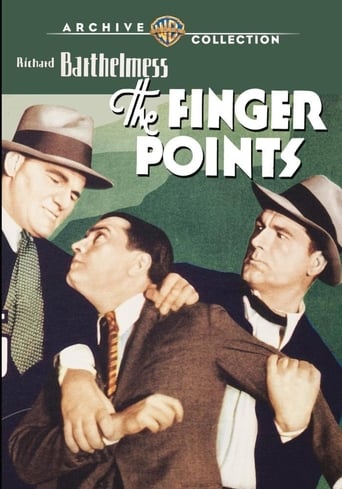rickrudge
The Finger Points (1931)Although Clark Gable is in this movie, he's not the star of it, although he steals every scene that he's in. Fay Wray is so hot in this movie, that it's worth you watching this film just to see how beautiful some 1930's actresses were. This is a morality tale and gangster movie. Lee Breckenridge (Richard Barthelmess) is a naive southern boy trying to get a job at a northern, big city newspaper. There he meets fellow reporters Charlie 'Breezy' Russell (Regis Toomey) and Marcia Collins (Fay Wray).His first assignment is to check out the opening of an exclusive club that is believed to be a gambling joint. There he meets Louis J. Blanco (Gable) and the club owner. His story breaks and the cops bust the club on the opening night. All of a sudden Lee is higher up in the paper, but he manages to get beat-up by some thugs and put in the hospital. Naturally the paper doesn't feel the need to help Lee out with his hospital bills, forcing him to be more creative in how he writes his stories in the future.He joins forces with Louis, basically extorting gangsters wanting to get a speak-easy or gambling joint started in their town. Lee is able to break a story about the ones that don't pay up, making him successful and richer. Marcia, who has found out that he's socking away pay-offs, doesn't like what Lee has become. Can Lee get out of this without getting killed, change his ways, and marry Marcia? Well, you know that crime doesn't pay. :-)
kitchent
This is another film I had to see in my unhealthy quest to see all of the available Fay Wray films out there. However, this film surprised me, as it was a pretty good story. It also has a young Clark Gable as a gangster in a scene stealing role that demonstrates his star power very early in his career. The plot has been covered in other reviews, so I'll keep my review short.The pluses: Fay looks great, Clark Gable is good, and the story is solid and interesting.The minuses: Richard Barthelmess is fine, but being from the south, he shouldn't have even tried the accent.Overall a fine film and definitely worth a viewing.
wes-connors
Savannah, Georgia born newspaper reporter Richard Barthelmess (as Breckenridge "Breck" Lee) takes a job at a "big city" (presumably Chicago) publication called "The Press". Right away, Mr. Barthelmess becomes a crusading investigator. Working for a measly $35 per week, he finds romantic compensation with pretty newspaperwoman Fay Wray (as Marcia Collins). Regis Toomey (as Charlie "Breezy" Russell) provides friendly competition. Alas, Barthelmess' investigative story gets him severely beat up by gangsters. After he gets out of the hospital and can't pay the bills, Barthelmess is tempted by the local crime lord's payroll, alongside tall gangster Clark Gable (as Louis Blanco). Never too convincing.***** The Finger Points (4/11/31) John Francis Dillon ~ Richard Barthelmess, Fay Wray, Clark Gable, Regis Toomey
marcslope
Socially-conscious Warners/First National delivered a corker of a newspaper melodrama in 1931, but this wasn't it: It was "Five Star Final." This fast-moving but muddled early talkie shares the crowded city desk with editors yelling "stop the presses!" and a cursory examination of the process of putting out a news daily. But here, the paper is genuinely excellent and socially responsible, not a muckraking tabloid. And the idealistic cub reporter (Barthelmess, who looks far too old to be a cub reporter) turns rotten awfully quickly, becoming a yes-man to a mobster (Gable in a typical early role, and effortlessly natural and likeable). It drains audience sympathy for our hero, and we don't see why his journalistically wise, sob-sister colleague (Wray, who looks too young to have Seen It All) would stick around with him, or take him back without his having really reformed. The motivations are confused throughout, and when our hero meets an unhappy fate, the movie seems to mourn him, but we don't. It's like a morality tale without a clear moral. Warners got better at its social realism quickly, and Barthelmess went from this comparative potboiler to the far more interesting "Cabin in the Cotton" -- again playing an idealistic sap, albeit one with more consistency.


